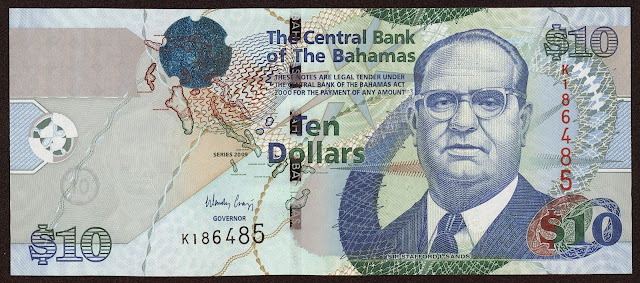Bahamas Banknotes 10 Dollars banknote 2009 Sir Stafford Sands
Central Bank of The Bahamas
Obverse: Portrait of Sir Stafford Sands, along with the series, a signature of the Governor of the Central Bank of The Bahamas together with the words "The Central Bank of The Bahamas. These notes are legal tender under the Central Bank of The Bahamas Act 2000 for the payment of any amount TEN DOLLARS". Outline map of the Bahamas at upper left.
The back carries a picture depicting Hope Town, Abaco. The red and white candy cane striped lighthouse in Hope Town is a noted local landmark. The picture is surrounded by various images, which include, on the left, a rainbow-arc flanked by the numeral $10 and the words “Ten Dollars”, above, the words “The Central Bank of The Bahamas”, and on the bottom center, the coat-of-arms of the Commonwealth of The Bahamas.
Watermark: Sir Stafford Lofthouse Sands.
Bahamian Banknotes - Bahamas Paper Money
2005-2012
1 Dollar 5 Dollars 10 Dollars 10 Dollars Queen Elizabeth II
20 Dollars 50 Dollars 100 Dollars
Sir Stafford Sands
Sir Stafford Lofthouse Sands (born 23 September 1913, Nassau – died 25 January 1972, London) was a former finance minister of the Bahamas, who held other high positions in the islands until his self-chosen exile in 1967. He helped create the Bahamas' tourism industry and is credited with being an architect of Bahamian post-war prosperity. He has been dubbed the "Father of Tourism" in The Bahamas.
Sands was a lawyer who, from 1946, represented Wallace Groves and other Americans who sought to establish casinos, resorts, free-trade areas, and other developments in the islands, primarily at Freeport. From 1958, when party politics began, Sands had a prominent role in the United Bahamian Party (UBP), which was in power until 1967. The 1967 Royal Commission of Inquiry reported that Sands and the UBP received large payments, represented by Groves as "consulting fees," from the casino interests. Sands then left the islands for exile in Spain, along with his considerable fortune.

